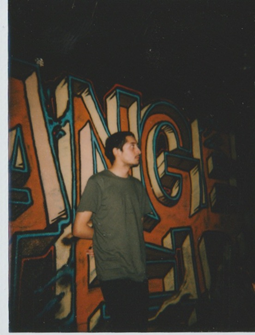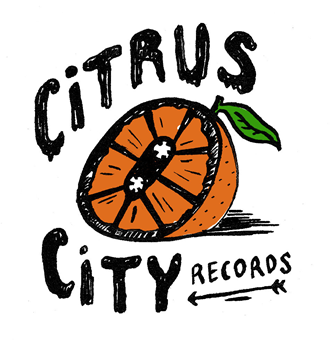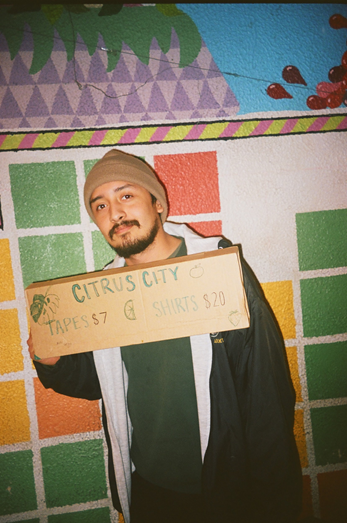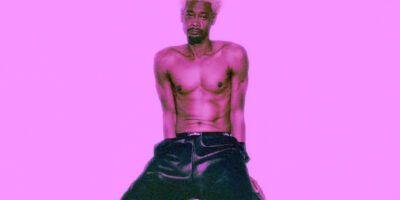Growing up in Virginia and playing in a band, the only way to make anything of my ambitions seemed to be to get out. Brooklyn and Los Angeles both seemed like some kind of DIY promised land, and I fantasized about living in a ramshackle bungalow like the one I reside in now in the same way some people likely fantasize about their own wedding day. Last year, I found a band called Crumb through Spotify that blew me away in a way no other band, with the exception of Hoops, has since I got to college. Looking for more information on the band, I found the Citrus City Records Bandcamp. Scrolling down I noticed that the label’s page happened to be tagged from Richmond and that the label behind up-and-coming artists including Peaer, Vundabar, Video Age, and Corridor was from my home state. I was lucky enough to catch up with Citrus City’s head honcho Manny Lemus and talk about life in New York, touring with Crumb, and whether or not Citrus City will get to 100 releases.
What led you to the idea of starting a record label? Is Citrus City the first label you’ve done work with?
Manny Lemus: I didn’t intern for labels or anything. When I went to VCU, I wanted to be a music journalist, and early in college I was a writer for this site based in Brooklyn and Montreal called IndieCurrent, so from there I was writing with them and doing EP premiers and interviews and things of that nature. I had a camera and I would go take live show pics and do show reviews around DC, Richmond, and Philly. I made a lot of friends because certain folks would send me submissions and I would always be on the lookout for music on Bandcamp. My whole thing when I was writing about music was looking for things that might not be getting that much coverage. There was a lot of stuff I would review with no physical medium and I was collecting tapes so I thought it would be a cool way to artifact things I was listening to. That’s what prompted me to start the label. At that time I was going to NoVa Community College.
NoVa’s right down the street from where I grew up.
ML: I was living at my mom’s place in Orange County, Virginia and I would commute back and forth. So that’s that early origins of how things got started.
And then you moved to Richmond?
ML: Yeah. I was at NoVa for a year and a solid half of a semester and I had enough credits and a GPA high enough that I transferred to VCU and I lived in Richmond for four-to-five years.

Photo by Chris Smith
What do you think of the Richmond scene? It seems like it has a lot of cool potential, but Strange Matter just closed. What do you think the future of the scene there is and how do you think it compares to New York, since you’re up in New York now?
ML: I think the thing about Richmond is that it’s a big enough music community that several sects can thrive and have their own fan base and growth. The hardcore and punk scene is a really big thing in Virginia. There’s a big noise scene that is doing really well. I may not get really involved, but I have a lot of friends that are really involved with those circles. There’s folks like Lucy Dacus, who’s from Richmond, and it’s pretty cool to see her do a lot of tours and overall be a favorite in music right now. While a few folks break out of the local scene, I like that it doesn’t discourage folks. There’s a big initiative of DIT “do it together.” There’s a lot of collaboration going on which is really refreshing. A lot of my thing is trying to educate people that their local music community shouldn’t be limited to indie rock or hardcore or emo. When people get down and say “Richmond sucks and it doesn’t have anything going on” and it’s like, okay, yeah, no guitar-centric bands are getting signed, but you still have rappers and other artists from different genres doing stuff. Nickelus F is one of the best overlooked rappers that happens to be from Richmond. They’ve done tours and collaborations with, like, Lil Ugly Mane and Michael Millions. Lil Ugly Mane is from Richmond. I think he’s in Philly now. Then there’s Alfred and McKinley Dixon, who’ve constantly put out great music and overall have a tremendous stage presence with their live shows and are touring outside the city. The whole point is that people tend to overlook the other genres and communities within Richmond just because the things that they’re familiar with might not be getting put on. I think there should be a push to support other things even though it might not be up your alley.
The thing I’ve noticed about Richmond, being in a band from Virginia, is that Richmond kids are really quick to remember and enjoy your music. My band hasn’t really played shows since we graduated high school, but we’ve dropped some singles. Every kid I meet from Richmond knows our name and our music and I don’t think that’s true of people I meet from anywhere else. I know it’s a small town but it’s one of the most supportive scenes I‘ve encountered.
ML: Totally. If you’re a Virginia band in general and do your thing people will really rep it. The moment people were, like, “Virginia has things going on,” was when Pharrell and N.E.R.D. and Missy Elliott and Timbaland were pushing the boundaries in early 2000s hip hop. It’s a scene people really respect, and then there’s a band that’s a reminder that Virginia has really stuff. It’s not revered as much as Philly or Atlanta or Boston or New York.
But I feel like Richmond is an objectively nicer city to live in than any of those except for maybe New York. It’s clean. There’s a lot of local business. Every time I go down to visit friends there it feels like how I imagine life in Brooklyn to be in some idealized way. It’s got pretty much everything you’d want from a Fishtown or a Bushwick but it’s, like, cheaper.
ML: It has its own charm and it has a lot of things that attracts a major city. Living-wise it’s still really affordable to live there. I remember there was a point that I was paying rent with utilities for $355 and now it’s like over $1,000 for my little apartment with six other people (in New York). I can see why people don’t leave there and I can see why it’s an artist-friendly place. While a lot of things are changing and gentrification has been at an all-time high, I think people will really push back to keep the grittiness and not let things change so much.
It’s a dope city. Citrus City Grille is the name of a restaurant near my school that my parents really like and it has a good breakfast buffet and good seafood. I’m assuming you didn’t get your label name from a restaurant in Orange, California. Where did your name come from.
ML: Citrus City came from me liking citrus fruits. I like the colors I associate with citrus fruits like oranges and yellows and some greens here and there. At the time what we wanted to put out was really upbeat and dream pop sort of stuff. We just wanted a blank name that was really fresh, but there was a Citrus Recording based in Miami, so my friend René was, like, we should just add city at the end. It sounded nice, so we came up with Citrus City.
It has a cool ring.
ML: There’s a Citrus City in California.
You should move the label there one day.
ML: When I was in Pomona for the Crumb tour someone was, like, “Hey there’s a Citrus City in California.” I’m hoping to go soon and check it out.
All my friends went to the Pomona show—I had class that night which was a huge bummer, and all the other ones in SoCal sold out, so I couldn’t make it. What was it like playing three sold out shows in, like, the same 60 mile radius in, like, three nights?
ML: Each time I go out on the road with them it’s so humbling. I was the first person to be, like, “You’re a really dope band. Y’all could do a whole lot more.” It’s about to be three years at this point. They just dropped their first EP and around that time they were such a fresh band and they had no ideas to tour or do anything of that nature, and at that point had only played, like, three or four shows. I reached out to buy a shirt or a tape or CD but they didn’t have anything so I offered to make them tapes and release them through Citrus City. That’s how that really started. I booked their first tour ever and it was a DIY tour. That tour was super cool but it was not anything where it is now where it’s three shows sold out back-to-back in the same radius. I think it’s been great to really see how much they’ve grown, not only as individuals, but as a band. I’ve noticed so many intricate changes in their setup, and the recordings for the album sound great. It’s just a crazy and inspiring experience because they’re really independent musicians and they’ve worked hard for everything. A lot of people assume that maybe they’re an industry plant. Not with them. Really, it’s just hard work and dedication, and the music is amazing.

Photo Courtesy of Citrus City Records
They’re kind of perfect music in a lot of ways. It’s surreal how good they are. Everyone I know who hears them loves them off the bat. They’re kind of a special band.
ML: They really are. It’s really just surreal. I remember listening to them for the first time and thinking they were really onto something. The last time I felt the way I felt for Crumb was with (Sandy) Alex G. I listened to Alex G as a freshman in high school, and now he’s really blown up. People like that dude’s music so much.
Do you have a gut feeling with most of the bands you sign? What makes you want to get a band on your label?
ML: In this day and age it’s a lot of submissions that are pretty overwhelming at times, and I try my best to get back to everyone. I’m really particular about the kind of music we release on the label. I always let people submit music to the email, but it doesn’t always mean I’m looking for submissions. A lot of the time I find the artists. Of the 85 releases we’ve done, only five have been through submissions. I just have a really particular tastes. A lot of it stems from personal interest. It doesn’t have to be from a specific genre. I feel bad because I get so many submissions at this point, and I really wish I could release everyone, but it’s mostly me that runs the label and finances it so I really have to be selective.
I saw on Twitter that you started the label with someone. Is that correct?
ML: Yeah, I started the label with my friend René Franco. They’re the co-founder. We split respectively before I moved towards the end of August.
How is it running a record label alone? I’ve courted the idea but it seems like way too much.
ML: It sucks. It really sucks. I always recommend people do it with someone who’s in it for the long run and is as invested as you are. On the record: I don’t want people to think my buddy just dipped, because a lot of the things that have happened with the label that have happened over the years have exceeded our original expectations. I was just doing this out of my mom’s basement, going to community college. So was my buddy René. We didn’t have any sort of delusions of grandeur. It seems like people really like the label that are outside of Virginia and I never expected to put out bands like Crumb or Vundabar or Video Age. I never thought I’d have a hand in a lot of these projects. It’s started to open up a lot of opportunities. One of the first bands that I started working with hands-on was Lance Bangs. We would throw house shows, because we were new to the scene and didn’t know who to talk to about booking. I just asked Strange Matter if they’d be down for letting me book a show, and that’s how I started booking. I started booking tours for certain Virginia artists and switched my major from journalism to PR. It got increasingly overwhelming. I just increasingly started to take on so much. My friend René said they wanted to do their own thing. We’re still really good friends. . . It wasn’t a bad split. It definitely sucks running it by myself.
Is it your only job or a side hustle?
ML: I wouldn’t even call it a side hustle because side hustle entails that I’m making money off of it. I would call it a hobby. I’m not getting anything out of it financially speaking. I work two part-time jobs at Urban Outfitters and Tom’s. For years I would work at restaurants. I used to be a server at Red Lobster and at a wine bar and a local family restaurant. I do a lot of things through my booking agency. I book tours for Virginia bands here and there, and that’s where I feel more comfortable providing a service, where I’m getting some kind of monetary compensation. I still work part-time jobs to fund it. It’s nice—I’ve gotten to a point that a lot of releases sell out really quick and that people are buying things the label funds itself.
Big respect, man. I’ve definitely courted the idea of starting a label but it’s been hard to part with money that hard to get. It’s awesome that you’re helping bands out of your own pocket. That’s a huge service. That’s so rad.
ML: Yeah. It’s been interesting, man. I really enjoy it and I can’t really complain. I just really like music. It’s been an interesting journey.
It seems like it. Do you mail all of the cassettes and shirts yourself?
ML: It’s pretty much all me, man. There’s been people who’ve helped me out here or there when I have a deadline. It’s just mostly me. I don’t have volunteers or interns. I just live in a really small apartment and run everything out of my bedroom. It’s pretty tedious, but it’s pretty rewarding, because it’s opened up doors for me to tour manage or tour with a band like Crumb. I get to see a lot of different parts of the country that I never would have imagined seeing. I’m a Va. boy, born and raised.

Photo by Emeka Ndubueze
It’s cool that this has been your gateway for that and your gateway for experiencing more of life. What are your future goals for the label? Do you ever want it to become more of a business or do you want to keep it how it is now?
ML: Dude. I ask myself that every day. I’ll always have these inner dialogues with myself because I want to continue doing it. Sometimes I’m like, I’ll just get to 99 releases and then call it quits just to annoy everyone that I don’t get to 100. But future goals is just financial stability and to get my mental health in check so I can give the label my all.
How many are you at now?
ML: I’m at 86.
Oh no. So the end might be near.
ML: I know. I’m gonna keep going at it until I lose the motivation for it—I’ll really stop, but at the moment, I’m keeping at it. There’s been opportunities to make this a more official label and get a distribution deal. Make it an LLC. More formalized, where I sign people to contracts and figure out ways to sustain it for longevity. I think a lot of the reasons I’m off-put by that idea is that it wasn’t my initial goal for the label. It’s not even the fear of selling out, because I think a lot of that rhetoric is bullshit. I feel like selling out doesn’t exist. I just don’t feel comfortable making it a traditional label. A lot of that would involve tying people to contracts and owning the masters. That’s really stressful on the bands. I feel like at the time being, I’m still going to stick to the same formula, which is mostly handshake deals. It’s the bands and the artists getting a free medium and also free money. That’s money for gear or food or gas. I’m very transparent and honest with everyone. I don’t even feel comfortable using label funds to buy a McChicken. Once I thought I would do that but I was, like, “I can’t. That’s not the purpose of this.” I stick to using any label funds for buying more mailers and cassette cases. Everything I make through Citrus City goes back to Citrus City.
That’s super respectable. I didn’t realize what a service Citrus City is. That’s the cool thing about the label though: You’ve got bands like Boys Age or Video Age or Crumb, but then you also get bands like Peaer. I feel like it’s very curated by what you like, and if it was a business, it might not be.
ML: It’s been interesting. I’m just really glad people on the internet are really receptive to it. People call it the people’s label—that’s pretty nice. I try to be as transparent and honest as possible, because when I talk to people about it, I think there’s this misconception of what a label is and what people behind the label do. People might think because Citrus City seems to be successful that the person behind it is making some money or just doing well and, yeah, I’m doing well in that I’m alive, and I have a roof over my head, but I’m not making money off of this. I’m not some P. Diddy or Dr. Dre music mogul. I’m just an average brown kid. I try to engage with people on Twitter as much as possible and chat with everyone. You and I, we’re just in it for the music. That’s the most important thing.
I’ve never really made a penny off of writing about or playing music. If the opportunity were there it would be great, but I’m not going to stop if it doesn’t. It’s what feels good. It’s what connects me with the people I meet and aspire to be like. It’s a cool way to see eye-to-eye with people I respect.
ML: And that’s the most respectable thing. People get really anxious and think that because they’re doing something creatively that they’re not taking off and that they’re a failure, but I wouldn’t really agree. I think a lot of success can be measured in different ways, or in different levels. I’ve seen a lot of people just stop doing things because they might not be “blowing up” or “taking off,” but the thing for me is that I’m talking to another fellow Virginia person who lives in LA and writes for a respected publication. That’s good enough for me, man.
One more question. What song that is not released on Citrus City should people drop everything and listen to right now?
ML: DRINKS, the supergroup that Tim Presley has with Cate Le Bon, and this band from Calgary, Alberta called Crack Cloud. CHAI EP by Ty Sorrell and Shormey is one of my favorite VA artists.
















[…] hard and finding early support with DIY figures like Manny Lemus (behind Richmond-based label Citrus City Records). Crumb did the impossible and made a rising career behind two brief EPs; less than 30 minutes of […]
[…] most recently DEAD, which was released just earlier this year with Richmond, Virginia-based label Citrus City Records, as well as various singles and EPs under their belt; their gently catchy, homespun pop lives, […]
[…] come about? We love Manny (Lemus, Citrus City founder) here at Merry-Go-Round. That was one of my favorite interviews I’ve ever done for Label Maker. How did you end up collaborating on that tape? On top of that, what does it even mean for two […]